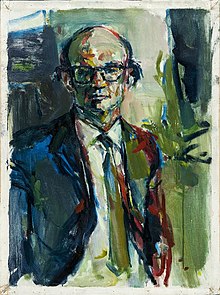Frans Stoppelman | |
|---|---|
 Stoppelman depicted in 1965 | |
| Born | 9 January 1921 Amsterdam |
| Died | 23 October 2007 (aged 86) Mexico |
Frans Stoppelman (9 January 1921 – 23 October 2007) was a Dutch press photographer who worked most of his life in Latin America, especially in Mexico. He published in Life, Paris Match, Quick and Stern. Stoppelman won a contest for best colour picture of the 1968 Olympic Summer Games. He had an eye for contrasts and absurd situations.[1]
Life[edit]
Youth and education in Amsterdam[edit]
Frans Stoppelman was born to Lodewijk Stoppelman, a textile merchant, and Hermanda Jacobs. His mother died when Stoppelman was 7. After a dispute with his stepmother at the age of 15, Stoppelman left home. He had two years of secondary education. Through evening courses he obtained entry-level diplomas for Dutch and French language and literature, and commercial administration.[2] He bought his first camera, a Kodak Brownie, using coupons.
Refugee and student of photography in Switzerland[edit]
Because of his Jewish background Stoppelman fled the Netherlands during World War II. He walked from Amsterdam to Switzerland where he arrived on April 13, 1942. Stoppelman was admitted in refugee-workcamp Les Verrieres organized by the Swiss Central Directorate for Homes and Camps.[3] He took pictures for sale to fellow-refugees. One of them, mr. H.M. Verhoeve, made an album that was later donated to the Jewish History Museum in Amsterdam.[4] In Lausanne, Stoppelman followed a training course in photography. After the war, Stoppelman stayed in Switzerland as press photographer.[5]
Travels through Latin America[edit]
In 1949 Stoppelman left Europe for Chile. While he was taking pictures of children in a swimming pool in Santiago, their father, head of the national police, inquired what he was doing. A position as police photographer ensued. Stoppelmans´ eye for absurd situations gave him an international breakthrough. Life magazine published his photo of people trying to get on the first electric stairs in Santiago. Another well-known photo is a Pietá picture of Grete Mostny with the Plomo mummy.
In the mid-1950s Stoppelman lived in the Dominican Republic. With help of the Dominican ambassador to the Netherlands, Luis Thomen, his photos were published in the book "Quisqueya, umbral de América".[6] Using the name Francis Stoppelman he published a photobook on Jamaica.[7]

Mexico[edit]
In 1968 Stoppelman travelled to Mexico to cover the Olympic Summer Games. His photo of the girl lighting the Olympic Flame won the first prize in the contest for best colour photo of the Games. His name was established in Mexico where he stayed until his death. In 1977 Stoppelman obtained third place in the category humour of the World Press Photo contest. Stoppelman was a great fan of the circus. He was honorary member of circus Atayde.
Works[edit]
Stoppelman's work is included in several museum collections, such as the Rijksmuseum, the Joods Historisch Museum, the National Historical Museum of Chile and the Jamaica National Library.[8][9][10]
Books[edit]
- Jamaica (Ernest Benn, London 1962)
- La República Dominicana. Quisqueya, umbral de América (1959), with a foreword by Luis F. Thomen.
- Mexico en movimiento (Nederlandse Rotogravure Maatschappij, Leiden 1970), with a foreword by Salvador Novo[11]
- Zo zit dat (Amsterdam 1979), also published in English as How 's that? and in Spanish as Eso es
Articles[edit]
- Photography in the mountains[12]
- El rodeo chileno (in: Sciences et voyages no. 133, January 1957)
Awards[edit]
- Best colour photo of the Olympic Summer Games 1968
- Third Place, Category Humour, World Press Photo 1977[13]
References[edit]
- ^ "Frans Stoppelman: oog voor ´t gekke". www.delpher.nl (in Dutch). Het Vrije Volk. 1979-12-24. Retrieved 2022-06-24.
- ^ ten Kate, Adriaan (2007). Nederlanders in Mexico (in Dutch). Mexico-City: Nederlandse Vereniging in Mexico. pp. 66–69.
- ^ Independent Commission of Experts Switzerland-Second World War (1999). Switzerland and Refugees in the Nazi era. Bern: Chronos Verlag. ISBN 3908661072.
- ^ "Het Zwitserse vluchtelingenkamp "Les Verrières" - Joods Cultureel Kwartier". jck.nl. Retrieved 2022-06-25.
- ^ "Frans Stoppelman (86) maand geleden overleden – PhotoQ" (in Dutch). Retrieved 2022-06-25.
- ^ "Un fotógrafo holandés que registró los inicios del Santo Domingo moderno: Francis Stoppelman". Plenamar (in Spanish). 2019-08-31. Retrieved 2022-06-25.
- ^ "Pancho Stopelman". www.delpher.nl (in Dutch). Het Parool. 1958-10-04. Retrieved 2022-06-24.
- ^ "Kerst- en nieuwjaarswens van Frans Stoppelman voor het jaar 1969, Frans Stoppelman, 1968 - 1969". Rijksmuseum (in Dutch). Retrieved 2022-06-28.
- ^ "A turtle being carried on the head of a young man · National Library of Jamaica Digital Collection". nljdigital.nlj.gov.jm. Retrieved 2022-06-28.
- ^ "Escuela de Derecho de Valparaiso". www.fotografiapatrimonial.cl. Retrieved 2022-06-28.
- ^ "México en Movimiento / Mexico on the Move Nederlandse Rotogravure Maatschappij Francis Stoppelman Photography". bintphotobooks.blogspot.com. Retrieved 2022-06-25.
- ^ Stoppelman, Frans (1949). "Fotograferen in de bergen". www.delpher.nl (in Dutch). Universeel tijdschrift voor de fotografie. Retrieved 2022-06-25.
- ^ "1977 Frans Stoppelman HM3 | World Press Photo". www.worldpressphoto.org. Retrieved 2022-06-25.